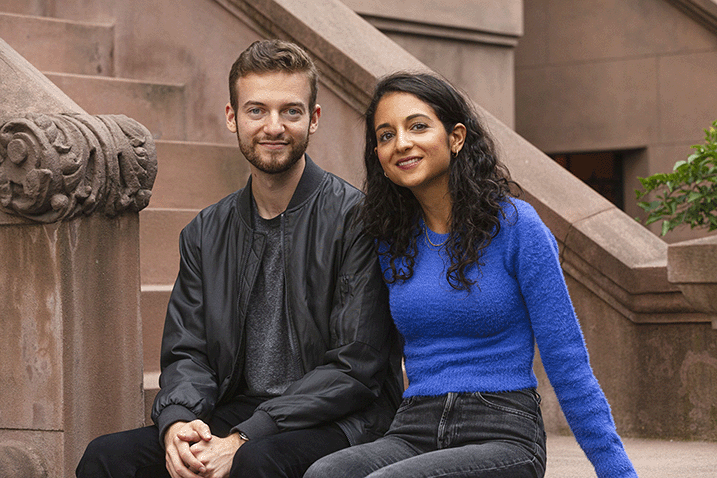Fulton
In developing their line of footwear insoles, Libie Motchan WG21 and Daniel Nelson WG21 faced an age-old problem: How do you make a boring product cool? Their solution is to take aim at foot problems that plague people of all ages, whether due to work, sports, or squeezing into fashionable but often painful dress shoes. Fulton’s insoles are designed to give customized arch support that enhances body alignment and helps ease pain and prevent injury. They’re also made from sustainable materials like cork and vegan leather, so customers can feel good about more than just their feet.
Parfait

(Illustrations by Cristina Spanò)
With a business model that recalls a successful Wharton-powered eyewear company, Parfait (formerly named Hairtelligence) is making it easy to buy custom wigs online. Recently part of Venture Lab’s VIP-X accelerator program and a New Venture Competition finalist, the startup — co-founders include Isoken Igbinedion WG21 and Simone Kendle WG21 — leverages computer-vision technology to capture customers’ head measurements and other information from just a few selfies. Customers choose from seven wig-customization options (from hair pattern to part style) and virtually try on wigs before shipment to their homes, cutting out the need for a trip to the salon.
Munchrooms
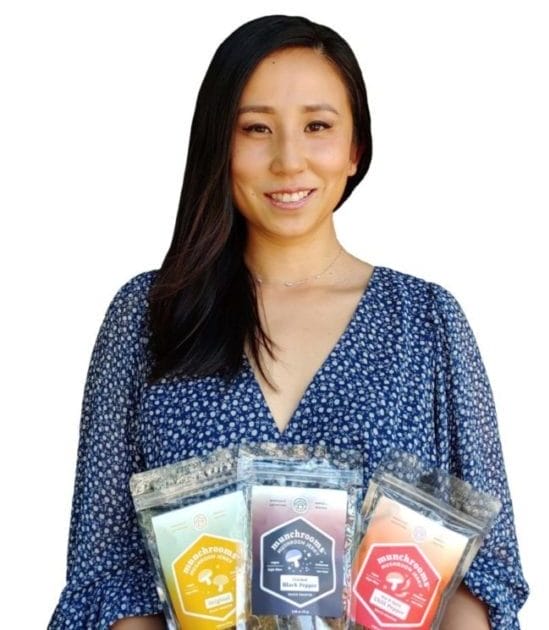
Gina Shi WG19
Described as “the perfect plant-based snack,” Munchrooms aims to offer a tasty and sustainable alternative to traditional jerky — one made entirely from mushrooms. Founder Gina Shi WG19 acquired a passion for the versatility of the humble mushroom as she explored Taiwan’s delicious vegan food and creative use of the fungus. Now, having developed Munchrooms with “big flavors and real ingredients” as part of Wharton’s VIP-San Francisco program, the company aims to share this healthy and satisfying snack with the world.
Somos
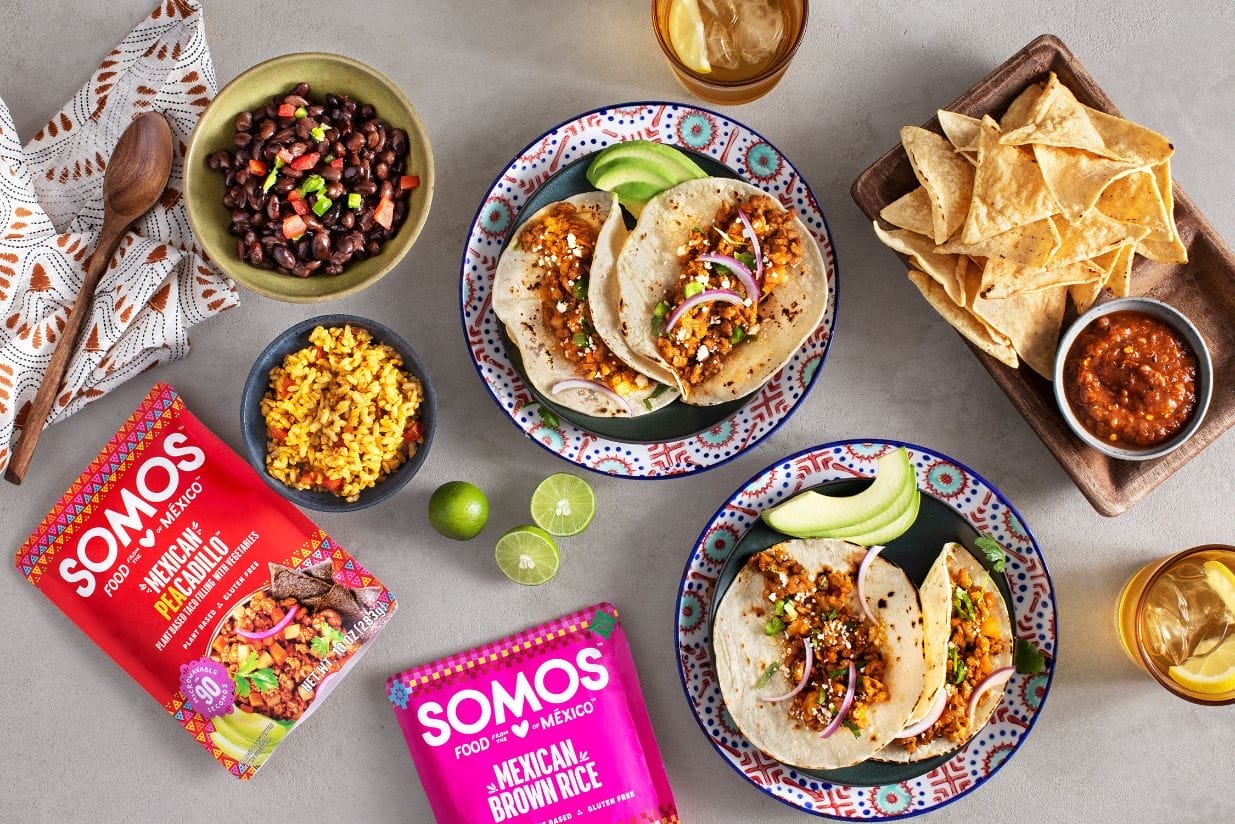 Three former Kind Snacks executives created Somos with a mission to bring authentic Mexican food to American pantries. (The name means “we are” in Spanish.) The brand’s lineup of rice, beans, chips, salsas, and vegetarian entrées was inspired by the home-cooked food that founders Miguel Leal WG02, Daniel Lubetzky, and Rodrigo Zuloaga ate themselves while growing up in Mexico. Wharton alum Leal — previously chief marketing officer at Kind — is chief executive of the new venture, which officially launched in January.
Three former Kind Snacks executives created Somos with a mission to bring authentic Mexican food to American pantries. (The name means “we are” in Spanish.) The brand’s lineup of rice, beans, chips, salsas, and vegetarian entrées was inspired by the home-cooked food that founders Miguel Leal WG02, Daniel Lubetzky, and Rodrigo Zuloaga ate themselves while growing up in Mexico. Wharton alum Leal — previously chief marketing officer at Kind — is chief executive of the new venture, which officially launched in January.
Karat
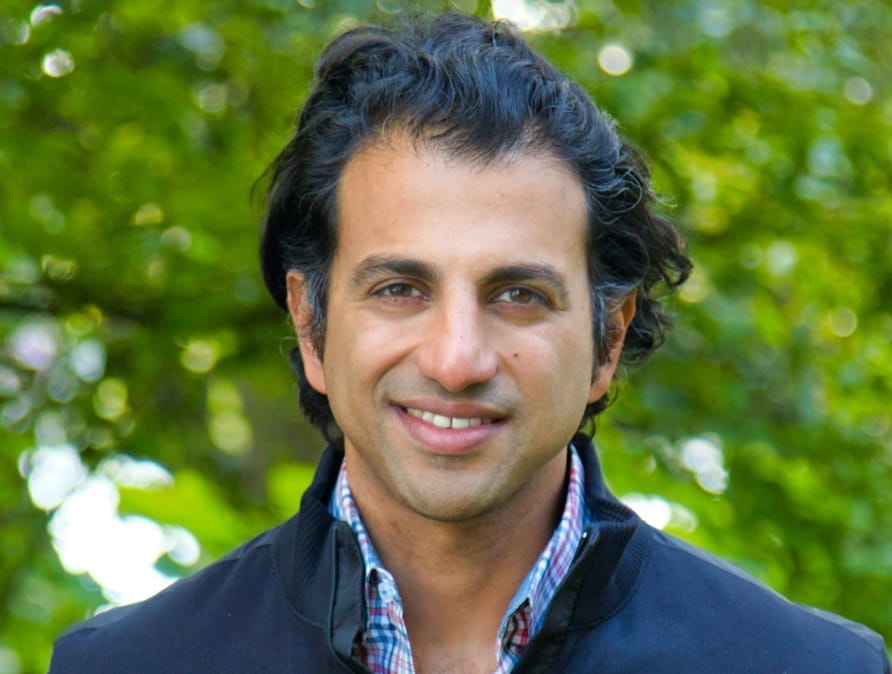
Mohit Bhende WG08
This billion-dollar startup is giving companies a leg up in the highly competitive search for software engineers. The brainchild of Mohit Bhende WG08 and Jeffrey Spector, Karat is accelerating the hiring process to help businesses land top talent before it gets swept up by other employers. With its unique platform and a team of “interview engineers,” Karat conducts technical-assessment interviews on behalf of companies at the start of the hiring process. The 24/7 service touts its ability to conduct 50,000-plus online interviewing hours each month and is designed to give job candidates more flexibility to schedule interviews while freeing up time for software engineers to do more developing.
Dia
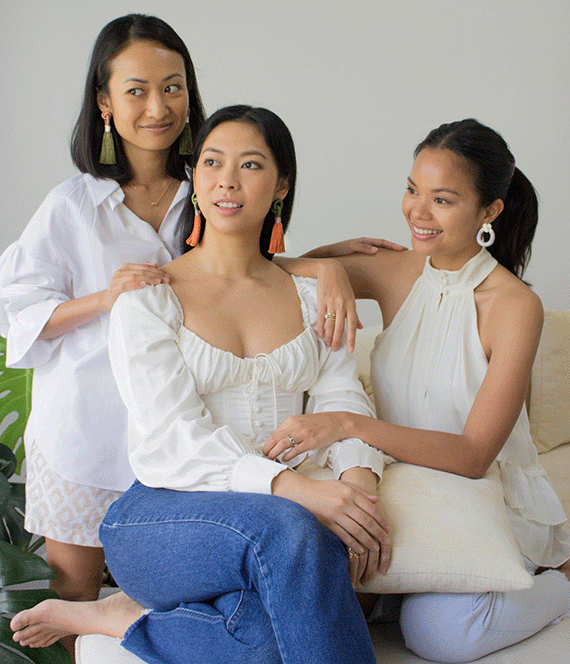
Kylie Francis WG18, Aisha Hassan, and Alia Farouk
Self-described as a “love letter to Southeast Asia,” Dia seeks to share artisanal brands inspired by the region with consumers around the world. Started during the pandemic by three Malaysian friends — Kylie Francis WG18, Alia Farouk, and Aisha Hassan — the venture curates the products it promotes on its website and tells the stories behind them. In addition to serving as a marketplace for everything from clothing to jewelry to art, Dia promotes the richness of Southeast Asian culture and craft.
iClima Earth
iClima Earth’s objective as a fintech firm is clear: to help decarbonize the planet by steering investor money into greener companies. To achieve this goal, iClima founders Shaila Khan Leekha WG04, Gabriela Herculano WG02, and Steve Berry W76 are shifting the conversation away from reducing carbon emissions and toward avoiding them in the first place. Using their own metric of “potential avoided emissions,” iClima team members have done extensive research to identify companies with the greatest impact. From that research, they’ve established two financial indexes of sustainable companies and, in turn, launched exchange-traded funds tracking those indexes as climate-friendly investment options.
BrainLeap Technologies

Attention is trainable — so says Jeff Coleman W94 and his wife, Leanne Chukoskie C94, who are using gaze-driven video games to help children improve their foundational attention skills. Inspired by Chukoskie’s research at UC San Diego, BrainLeap Technologies has developed the “Attention Arcade,” a gaming platform that uses an eye tracker to control the on-screen action. Built on the premise that eyes and attention move in tandem, the Arcade improves and strengthens focus for children with ADHD — outcomes backed by two scientific studies and the company’s refund pledge if a child doesn’t see measurable results.
Chef Robotics

Rajat Bhageria W18 GEN18
Chef Robotics founder Rajat Bhageria W18 GEN18 was named to this year’s Forbes 30 Under 30 list for his efforts to automate commercial kitchens — and for the investment his work has attracted. The business has racked up at least $7.7 million from a long list of backers, including Kleiner Perkins, Bloomberg Beta, and Red and Blue Ventures, a fund that focuses on Penn companies. Although Chef Robotics is still in its early stages, there are some things we know about the business: There will be robots — and those robots, we’re promised, will increase production, reduce costs and food waste, and improve their own performance via machine learning.
Mocktail Club
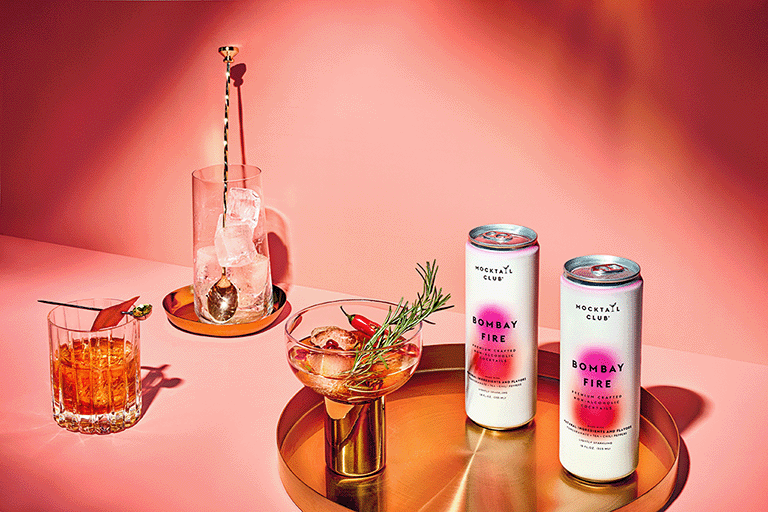 Mocktail Club founder Pauline Idogho WG10 aims to capture the palates of social drinkers seeking non-alcoholic options. For her line of globally inspired ready-to-drink mocktails, Idogho has assembled a collection of bold, innovative drinks served with a twist: healthy ingredients flowing with fruit-forward flavors that maintain the complexity of traditional adult beverages. Mocktail Club concocts drinks for any occasion — from parties to brunches to baby showers — and donates a percentage of sales to providing access to clean water in underdeveloped nations.
Mocktail Club founder Pauline Idogho WG10 aims to capture the palates of social drinkers seeking non-alcoholic options. For her line of globally inspired ready-to-drink mocktails, Idogho has assembled a collection of bold, innovative drinks served with a twist: healthy ingredients flowing with fruit-forward flavors that maintain the complexity of traditional adult beverages. Mocktail Club concocts drinks for any occasion — from parties to brunches to baby showers — and donates a percentage of sales to providing access to clean water in underdeveloped nations.
True Places
 “When you throw a backyard tailgate, this is the seat everyone is going to fight over,” Rolling Stone said of True Places’ Emmett folding chair. Created by Ben Knepler WG10 and Nelson Warley, the outdoor perch features an aluminum frame, a movable cup holder, and flexible fabric that forms the seat and back. Other bells and whistles include an optional phone holder, a bottle opener on each arm, and — for people buying two Emmetts — carrying bags that can be connected to form a backpack for both chairs.
“When you throw a backyard tailgate, this is the seat everyone is going to fight over,” Rolling Stone said of True Places’ Emmett folding chair. Created by Ben Knepler WG10 and Nelson Warley, the outdoor perch features an aluminum frame, a movable cup holder, and flexible fabric that forms the seat and back. Other bells and whistles include an optional phone holder, a bottle opener on each arm, and — for people buying two Emmetts — carrying bags that can be connected to form a backpack for both chairs.
Madefor

Patrick Dossett WG14
Ever wonder what your best self looks like? Madefor co-founders Patrick Dossett WG14 and Blake Mycoskie use neuroscience and proven principles of psychology to help establish meaningful, lasting change in people’s lives. Grounded in a deep understanding of the brain’s physiology, the Madefor step-by-step program provides the tools to understand how establishing small, intentional goals leads to healthier behavior and overall wellness. The program is built to unlock one’s unique potential and true purpose, with a focus on learning to anticipate challenges and discovering how to thrive.
Eddi
 “Sustainability, meet style.” That simple slogan encapsulates the mission of Eddi, the luxury homeware and soap brand launched by Wharton duo Sarah Pura WG13 and Jamison Pereira WG16 in 2020. Customers can eliminate plastic waste by recycling Eddi’s aluminum hand soap bottles, replenishing their soap stock with the brand’s own all-natural products. All fragrances (from wood smoke and amber aromas to salt air scents) are created with essential oils and a coconut base, to avoid harmful synthetics. The company is also putting money where its mission is: Eddi is a member of 1% for the Planet (dedicating one percent of all sales to environmental causes) and is pursuing a B Corp certification.
“Sustainability, meet style.” That simple slogan encapsulates the mission of Eddi, the luxury homeware and soap brand launched by Wharton duo Sarah Pura WG13 and Jamison Pereira WG16 in 2020. Customers can eliminate plastic waste by recycling Eddi’s aluminum hand soap bottles, replenishing their soap stock with the brand’s own all-natural products. All fragrances (from wood smoke and amber aromas to salt air scents) are created with essential oils and a coconut base, to avoid harmful synthetics. The company is also putting money where its mission is: Eddi is a member of 1% for the Planet (dedicating one percent of all sales to environmental causes) and is pursuing a B Corp certification.
Kasa
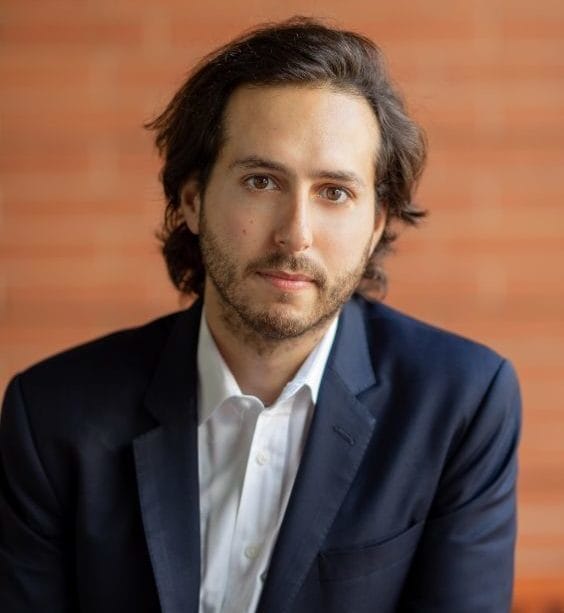
Roman Pedan ENG10 W10
Looking for another way to find the perfect stay? Characterized by Forbes as “a more formal Airbnb,” Kasa was founded in 2016 by Roman Pedan ENG10 W10 to help travelers locate reliable short-term bookings. The startup’s differentiator: The company has amassed its own portfolio of apartments and hotel rooms, meaning Kasa — rather than individual owners — styles each space, provides amenities, and handles check-ins and departures. The company operates at some 60 locations across more than 40 U.S. cities and even has spots in Tokyo.
Published as “Southeast Asian Brands, the Warby of Wigs, and Talent-Search Tech” in the Spring/Summer 2022 issue of Wharton Magazine.
Read about other alumni-powered ventures in the full Watchlist.




















